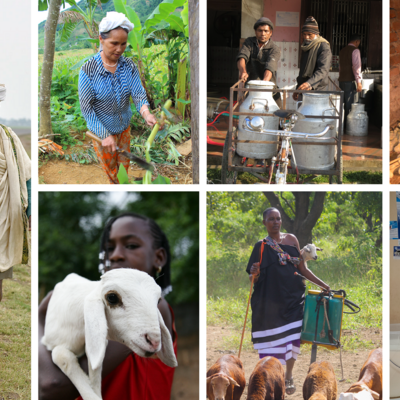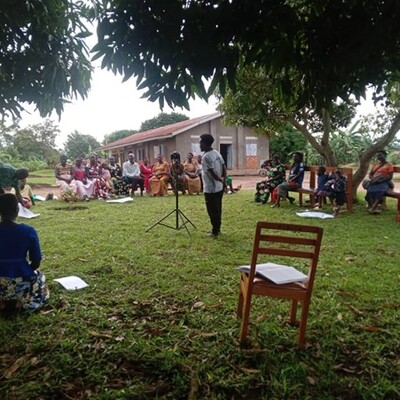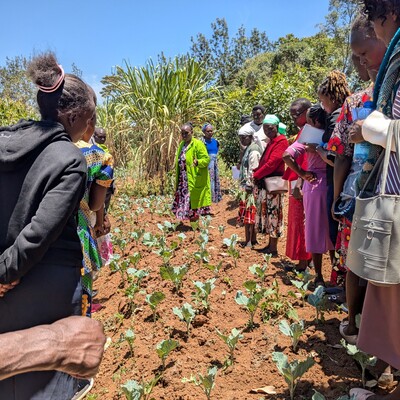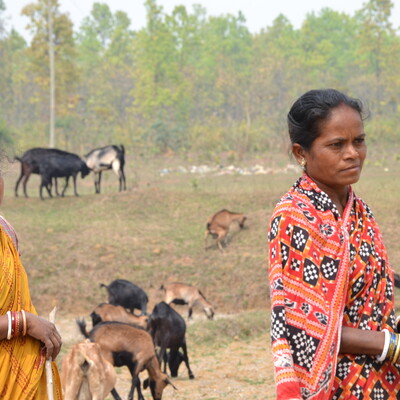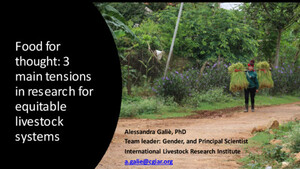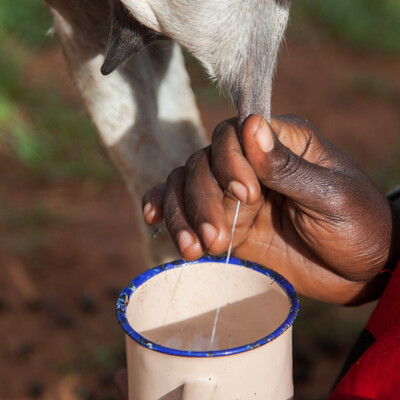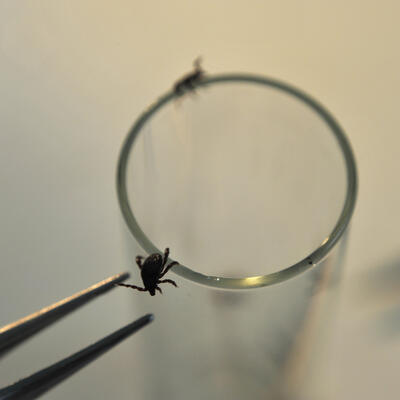

Ghana: Why the goats won't die on her watch
Posted on
by
- Georgina Smith
- Alessandra Galiè

Across Ghana, 63% of the extremely poor depend on agriculture.

Yet Ghanaian women own fewer livestock, use less fertilizer, own less mechanical equipment and have fewer years of education and lower school attendance rates than men.

Rural women usually do unpaid work on family farms.

They are responsible for looking after small animals like goats, chicken or sheep—but with limited access to veterinary services. Mortality rates among these animals is generally high.

Little is known about the gender dynamics surrounding veterinary services in Ghana.

This new research hopes to change that.
The worried-looking man stands outside a neat, semi-circular thatched cottage.
Shifting from foot to foot, the man’s anxious gaze moves to the small goat cradled in his arms. Forty-five-year-old Samuel Ndaa, chief technical officer at the district veterinary services, comes to the door to see the man, wearing his beige coat.
Samuel takes a brief look at the goat and disappears, reemerging with a small medicine box and vaccination. A small sum of money exchanges hands, Samuel vaccinates the goat, and the customer, looking instantly relieved, says goodbye and makes his way home with the goat tucked under his arm.
That customer could never have been a woman, even if the goat belonged to her.
As one of six veterinarians in the Bawku West District of the Upper East Region, northern Ghana, Samuel is already aware of the reasons why. Under the shade of a large tree outside his office in Zebilla, a bustling market town near Burkina Faso’s border, he explains the first reason.
Responsible for servicing more than 68,000 households, he runs through a list of his biggest challenges: lack of access to drugs and charging farmers a reasonable price that they can afford. But there is another, critical challenge: where to put the drugs when he has them.
The common ailments he treats in chickens include tapeworm and Newcastle disease, and in goats peste des petits ruminants and contagious caprine pleuropneumonia.
The medicines he uses need to be kept cold. With no refrigerator in his office, Samuel keeps the drugs in a small refrigerator at his home. And so he explains the first reason his customers can’t be women: it is culturally inappropriate for a married woman to visit a man in his home.
.

‘We realize that women are responsible for the bulk of family development’, he says, adding that livestock farming is a business for all, not only for the elders or men. ‘But women have little say when it comes to agriculture.’
Yet women, like 28-year-old Dorcas Ayere, are often in charge of looking after animals on the farm, especially goats, sheep and chickens. In fact, they rely on these animals for scarce household income.
‘Traditionally, women here are not supposed to own livestock; everything we have belongs to our husbands’, explains Dorcas. ‘Before we take a decision, we consult with our husbands. If a woman were to say the animals are her property, it is disrespectful.’
As well as doing household chores each day, Dorcas feeds and looks after the family fowls, chickens, sheep and goats. She also sells agricultural inputs, such as pesticides, at the local market, though she lacks credit to be able to buy them in bulk.
.



.



The chief technical veterinary officer Samuel Ndaa in Bawku West District of the Upper East Region, northern Ghana.

A family with livestock in Bawku West District of the Upper East Region, northern Ghana.

Georgina Nawai is a livestock farmer in Bawku West District of the Upper East Region, northern Ghana.

Medicines this chief technical veterinary officer stores in his home
With the onset of increasingly unpredictable weather, when the family crops can fail, livestock are even more important to her than ever. ‘In the rainy season, I sell animals to pay for my children’s schooling, for health services and for inputs for our farming.’ But she can’t access drugs for her animals.
Dorcas would like to be a veterinarian so she could help women livestock keepers like herself access animal drugs and advice. But such educational opportunities are in short supply in her district, especially for women.
Nineteen-year-old Georgina Nawai lives with her husband and parents along a remote track an hour from Zebilla by car. Responsible for looking after her father’s cows, sheep, goats and guinea fowl, she has no preventive medicines or vaccinations and relies on the local vet for livestock advice.
Like Dorcas, she is interested in becoming a vet. Throwing a handful of maize to a noisy group of speckled guinea fowl roaming around her house, she talks of a second major limiting factor facing women when it comes to seeking veterinary help for her animals. It is distance.
Juggling other household chores, Georgina can’t ‘pop out’ to the vet and quickly come home again. ‘I have a lot of other things to do. I cook, wash and clean; I take care of my family and look after our animals’, she explains. ‘The nearest town is hours away and I have no means of transport.’
Georgina then notes a third challenge: ‘It’s difficult for men to take what women say seriously. They feel like women are inferior. Men talk to each other as colleagues; they understand each other’, she says.
.

‘Other women understand me and are ready to talk to me. If I become a vet, then it will benefit me, my family and it will benefit the community’, she says, explaining that currently, there are no female vets she is aware of who she could call for animal healthcare.
Change is stirring: Ghana’s ministry of food and agriculture has appointed ten voluntary community animal health workers, five men and five women, in Bawku West District, to be trained in detecting and treating animal diseases in the rural communities where they live.
Supporting women animal health service providers is also the focus of a new research-for-development project led by CARE International in collaboration with the International Livestock Research Institute (ILRI) and a social enterprise called Cowtribe Technology Limited.
The project, ‘Transforming Vaccine Delivery Systems’, aims to tackle these challenges head-on, including changing ingrained cultural beliefs and perceptions about female ownership of animals and decision-making about their healthcare or about hiring female animal health service providers.
The project researchers will work with 50 households in 10 communities each in Bawku West and Pusiga districts. Male and female farmers, veterinary staff, traditional leaders and local extension officers will take part in the participatory research.
As part of this research, Cowtribe in Tamale, Ghana’s third largest city, located a four-hour trip from Zebilla by car, is encouraging and supporting female vets to apply. They have already hired one female vet on their team and plan to hire as many more as they can.
Founded by passionate entrepreneurs 37-year-old Peter Awin and 30-year-old former news presenter Alima Bawah, the enterprise’s name reflects the desire of every farmer here to own a cow—usually by buying and selling smaller animals such as goats, sheep or chickens—to raise the money needed to buy a cow.
Things are busy. Taking a breather from back-to-back meetings, the entrepreneurial duo have just signed an agreement with Ghana’s ministry of food and agriculture to conduct around 60,000 livestock vaccinations across the country.
The vaccines will be dispatched in a massive pilot project across 15 districts and deployed on 3,280 farms now registered on an app developed by Cowtribe. The vaccination campaign will protect an estimated 4,000 cows, 8,000 sheep and 9,000 goats against critical and common livestock diseases in this region.
The young entrepreneurs founded their business five years ago, specifically to help farmers get better access to animal vaccinations and medicine. ‘Any farmer you talk to will tell you: "I keep the crops to eat today; I keep the livestock for my savings for tomorrow"’, explains Peter.
‘We want to ensure that no farmer in Ghana is denied access to good-quality and reliable healthcare for the animals he or she depends on for a livelihood. And we mean any farmer—man or woman.’
Cowtribe was born after Peter, who was selling weather insurance for crops at the time, noticed that farmers kept asking about livestock insurance. ‘And that got me curious—why were farmers so concerned about insurance for their animals?’
.



He ran a survey and discovered that in most rural areas, farmers lose half of their small ruminants and poultry to disease during some seasons. The low availability and high expense of livestock vaccinations, as well as very long distances to vaccination facilities, were the top-ranked hurdles his survey disclosed.
‘We were surprised how big the problem is’, explains Peter. ‘It’s not just one community. Almost every farmer that we talked to complained about a lack of veterinary services.’
So Cowtribe launched ‘Uber for Vets’. ‘It was a terrible idea’, says Peter. ‘Vets were traveling 50 kilometres to treat an animal only to be called back to the same community again the next day. Five out of seven vets resigned.’
‘But we learned that most of these diseases are actually preventable.’ Now, farmers can buy preventive bundles for their animals through an insurance-like package on a mobile phone app, signing up and paying for the services beforehand.
Through Cowtribe, farmers will be able to order vaccinations and data will be collected about customer behaviour. Project staff will use this rich information to better target female farmers in future.
‘We describe ourselves as a tech-enabled, last-mile delivery provider of preventive veterinary healthcare for livestock’, explains Peter.
But can women be vets? Targeting women has been a challenge. The reason—and a fourth major factor stopping women from seeking veterinary help for their animals—is the concept of asset ownership in this region.
‘Livestock are an asset, like a car or motorbike or house, for most of these farmers’, explains Peter. ‘Men here own assets. Women use assets.’ Co-founder Alima puts it another way: ‘Women feel husbands own them. So anything they own, their husbands also owns.’
Which puts Cowtribe in an awkward position. Because while signing women up to receive their services is an important part of their work, the women they are targeting do not regard themselves as customers. They do not feel entitled to claim the animals are ‘theirs’.
‘Women don’t want to be seen to be the owners of the livestock’, explains Peter. And this will take time to change. ‘Breaking certain assumptions around ownership of animals, to allow women to feel they own the animals, is really essential.’
.

Part of the solution involves actively recruiting women as vets. ‘Men will talk to men’, says Peter. ‘Women can walk into a customer’s kitchen, talk to the woman and ask: ‘Do you have chickens for me to vaccinate?’ Men will not walk into the kitchen and have that conversation.’
The aim of this new research is to challenge some of these ingrained gender beliefs—about who can own livestock, who can be a vet, and who can have knowledge about livestock—to create a gender-responsive animal vaccination system.
Testimonials

Alessandra Galiè
ILRI senior scientist, gender
We know that addressing gender disparities in agriculture alleviates poverty and food insecurity. But simply giving rural households resources or technologies will not shift ingrained patterns of inequality or translate into benefits for women.
Instead, using a mix of gender ‘transformative’ and ‘accommodative’ approaches, researchers will investigate the fundamental causes and consequences of gender inequality in Ghana.
‘Accommodative approaches look at the current status quo and work around it’, explains Galiè. ‘In this situation, because it’s inappropriate for a married woman to visit a man in his house, an accommodative approach would look at how to bring vets to the community.
‘But this approach only addresses the symptoms of the problem. By taking a new vaccine to the household, for example, we do not solve the problem of women’s limited mobility; to the contrary, we may even promote women’s confinement further.’
‘A transformative approach would question, together with the communities, the perception that it is inappropriate for a woman to visit a male vet in his house. This approach addresses the root causes of inequality. We ask questions like: “Why are men free to move around and women aren’t?”’
But transformative approaches are difficult to take and in some cases they may even be dangerous, Galiè says. They could result in domestic violence or other conflicts if conversations are not handled with care.
.



So the members of this project will make use of a mixture of approaches to help women access services, and then, among selected groups, question some underlying assumptions. ‘We may ask: “What would the household gain or lose if women took animals to the vet? How can we involve men in supporting women to reach the vets? Why can’t women be vets or own livestock?”’ says Galiè.
By comparing the two approaches, researchers hope to understand which approach—or combination of approaches—works best, to make the vaccine system more responsive for women, reaching women farmers and employing women animal health service providers.
So that in future, no woman in Ghana will have animals dying on her watch.
--
The Livestock Vaccine Innovation Fund is supported by the Bill & Melinda Gates Foundation (BMGF), Global Affairs Canada (GAC), and Canada's International Development Research Centre.
Investors and partners
Experts
You may also like
Related Publications

Gender considerations in innovation platforms in the livestock sector in Mali
- Gning, S.B.
- Dione, Michel M.
- Sene, M.T.D.
- Sow, Ahmadou
- Fall, Abdou

Gender relations and women's empowerment in small-scale irrigated forage production in the Amhara and SNNP Regions of Ethiopia
- Omondi, Immaculate A.
- Njuguna-Mungai, Esther
- Bezabih, Melkamu
- Teufel, Nils
- Galiè, Alessandra
- Njiru, Nelly
- Kariuki, Eunice
- Mulema, Annet Abenakyo
- Baltenweck, Isabelle
- Jones, Christopher S.
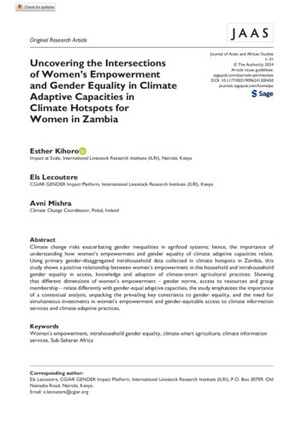
Uncovering the Intersections of Women’s Empowerment and Gender Equality in Climate Adaptive Capacities in Climate Hotspots for Women in Zambia
- Kihoro, Esther
- Lecoutere, Els
- Mishra, Avni

A qualitative inquiry of the effects of social protection and nutrition education on climate resilience of rural women and their households in southern Bangladesh
- DuttaGupta, Tanaya
- Roy, Shalini














